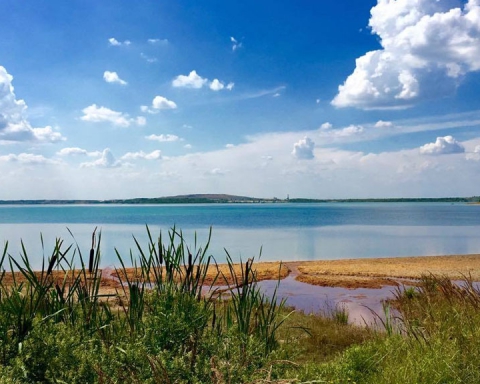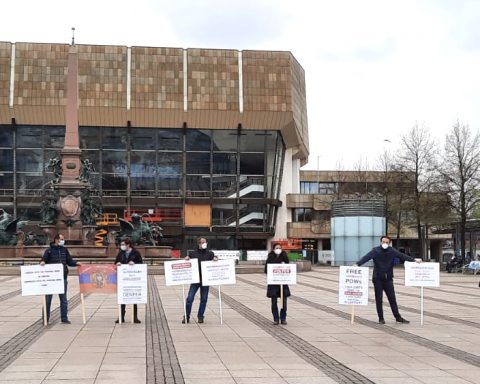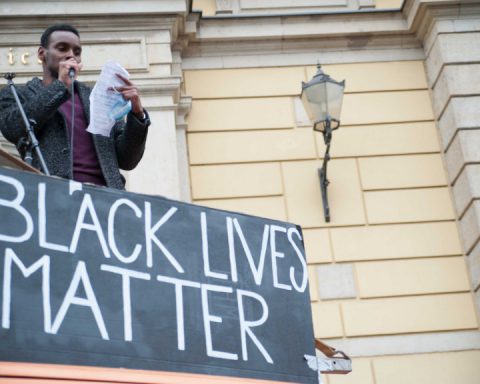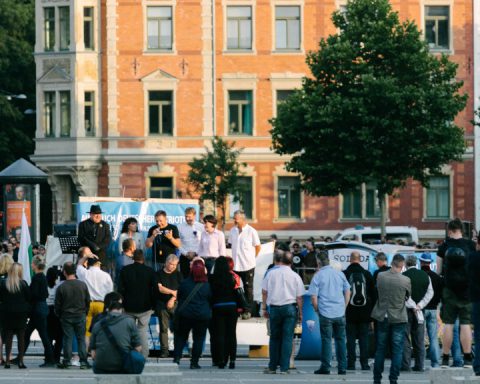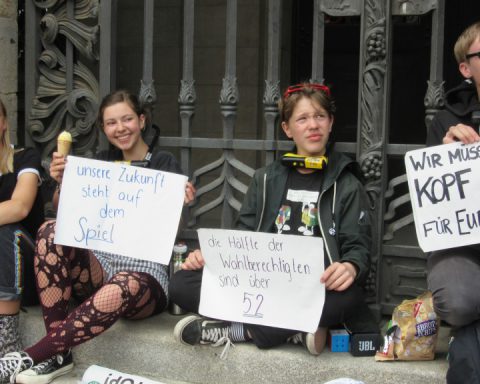The month of July sees much of Germany celebrating Rainbow Pride. LGBTIQ folks (lesbian, gay, bisexual, trans- and intersexual, queer) unite to fight hatred that they face in everyday life, but also on a structural and institutional level. The battle for equality is one to be fought in our homes, on discriminatory laws, on media portrayal and in various other spheres of life.
To all these fronts of activism, another layer was added in the midst of refugees seeking shelter in Germany. In September 2015, I returned from a year abroad. I had seen from a distance the increasing number of newcomers, and worryingly observed the wave of racism pertaining to every aspect of German society. Racialized violence was sparking daily attacks against refugee camps. Bigoted politicians were using momentum to push forward their populist agendas, with thousands of Germans following lead to unite in Islamophobic and racist campaigns, PEGIDA among them.
Media articles naturalized refugees, making them a homogenous mass, stripped of any individuality. The different conflicts and turmoil that have led to the biggest influx of migration since World War II have been rendered invisible. The various biographies that people from Morocco to Somalia, from Syria to Iraq to Afghanistan, and so many more, carried in their bags have been packaged into a single story: The refugee who threatens an imagined German culture, social and value system.
In the summer of 2015, articles about homo-, inter- and transphobia, supposed to be rampant among refugees, made headlines.
They portrayed LGBTIQ refugees as being the victims of their own culture, expelled, harassed and persecuted.
The outrage was quick to follow. Mostly white German LGBTIQ groups started to organize. They were offering “help” to save newcomers from their own fate, their own biographies. The “good” queer refugees, who were worthy of help, were divided from “bad” homophobic ones, the ones to which the “refugees welcome” slogan was not extending.
Within this process, human rights violations pertaining to freedom of sexual orientation and identity became solely associated with people from the Global South (a Western definition of developing countries). I felt compelled to challenge this narrative. In October 2015, I started the Queer Refugees Network Leipzig (QueeRNL).

The initiative, supported by RosaLinde Leipzig and CSD Dresden, aspired to organize LGBTIQ refugees for self-support and collaboration with other refugees and locals, while also building up a voice for people who are always spoken for and seldom listened to. The QueeRNL brought together newcomers and locals on a participatory and equal level.
Refugees often need support with papers that are mostly administered and to be responded to in German. Institutions like the Immigration Office or the Social Welfare Office are understaffed with translators, without language competence and mostly helpless in transcultural settings. Locals offer assistance in these situations that are otherwise hard for refugees to navigate.

The asylum process is not transparent for the people who apply, leaving many newcomers feeling insecure and thus making it easier to exploit their helplessness. While working as the project manager of QueeRNL, I have observed that refugee camps and state institutions have, without consent, been forwarding and trading sensitive data and personal information regarding asylum cases.
Proclaimed volunteers get to make decisions that institutions responsible for asylum applicants rarely check up on. Fortunately, the trust invested in them is often handled with great care. But this highlights how exposed refugees are in the process and how little agency is given to them.
Agency was central to the idea of the Queer Refugees Network.
In language tandems, newcomers and locals get to trade their competences. Mini projects have been collaboratively developed and carried out. A vegan KüFa, translating to “kitchen for everyone”, invites locals and internationals alike to cook and share a meal together. We talk about refugees and Germans on paper, and about friends once we get past the headlines. Nothing connects people faster than feasting on Syrian “mulukhiyah”.

Discrimination against LGBTIQ asylum seekers in refugee camps is very real. But we can’t stop here. Homo-, inter- and transphobia have always been present while we’ve been working within the network. Not only from refugees in camps, but more frequently from Germans who work in these camps.
A camp manager was victim-blaming a refugee from Namibia when saying he “acted too gay”, asking him to make an effort to be more “cooperative and straight-acting”. She finished off by noting that Namibians do not deserve the right to be refugees anyway, so any intervention in the situation would be unnecessary.
Applying for a change in housing for other queer refugees, our claims were mostly rejected. “Discrimination based on sexual orientation or identity”, the responsible office proclaimed, “is not a legitimate reason to ask for specific support.”
Prejudice against queer communities is not installed in certain cultures and foreign to others, but a global power structure we need to be fighting rigorously.
We are eager to point fingers when it comes to hatred towards the LGBTIQ scene, but when are we vocal, and when do we remain silent? In the queer scene itself, racism has materialized into fear mongering, with the image of the refugee becoming an enemy that threatens a queer utopia. This queer utopia has not yet been achieved. The main concern are not refugees, not Germany, but societies as a whole.
Homo-, inter- and transphobia have poisoned our communities through deeply digging its trenches into structures and institutions. Our response to this cannot be narrow-minded and racialized, but has to be a thorough and bold stance against discrimination as a whole.
In Islam, Jihad describes the internal and external struggle with our system of values that we fight everyday within ourselves and in our surroundings. The Queer Jihad is one that has to be fought peacefully against our internalized hatred as a LGBTIQ community, as well as the discrimination we face in society. Our Queer Jihad is a holistic battle to be fought not only with a specific group of people, but with society as a whole.
As we celebrate LGBTIQ Pride, I urge us to remember that all oppression is interrelated. We cannot battle homo-, inter- and transphobia via racism. We cannot let bigots use our struggles against each other. As Emma Lazarus aptly put it: “Until we are all free, we none of us are free”.
The Queer Refugees Network Leipzig can be found on Facebook. If you are interested in volunteering with us, please contact refugees@rosalinde-leipzig.de.
Donations for the project are gratefully received under the keyword “Queer Refugees Network Leipzig” through RosaLinde Leipzig, Volksbank Leipzig, IBAN DE90 8609 5604 0307 2307 39, BIC GENODEF1LVB.
By Tarek Hassan



